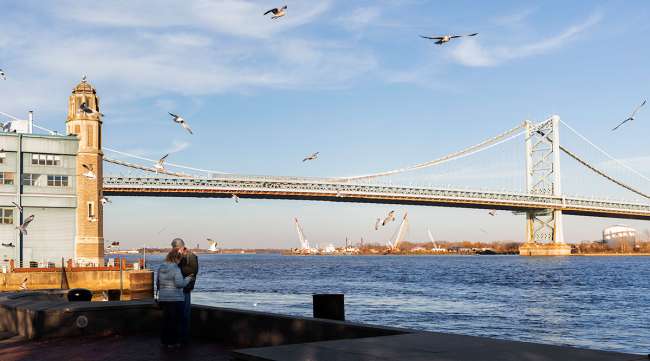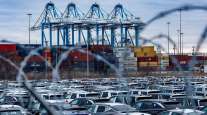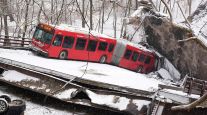pennlive.com
Pennsylvania Truckers Object to Bridge Tolling Plan

[Stay on top of transportation news: Get TTNews in your inbox.]
The Pennsylvania Department of Transportation is moving forward with its controversial plan to consider charging tolls — possibly $1 or $2 — on as many as 10 major bridges in the state.
But representatives from the trucking industry told the state Senate Transportation Committee tolls would hurt their industry.
PennDOT Secretary Yassmin Gramian told a Senate panel on Jan. 25 the list of potential bridge candidates to be tolled will be announced in mid-February.
The bridges will be spread across the state and located on interstates.

Sustainable trucking is here. In this episode, we'll talk to two major players in the transportation technology sector that are helping fleets move closer to total supply chain sustainability. Hear a snippet, above, and get the full program by going to RoadSigns.TTNews.com.
Once the list is finalized, the department is obligated to conduct public outreach for each of the bridge candidates. Special emphasis is being placed on identifying the economic impacts to underserved populations as well as direct and indirect impacts as a result of traffic trying to avoid the tolls, she said.
The revenue generated from the tolls paid by users, including those from out of state, is estimated to be upward of $1.8 billion. Tolls collected on a bridge would be used to pay for its rehabilitation or replacement and ongoing maintenance. Any money left over would be directed to other projects in the same transportation district, she said.
This idea, approved in November by the Public Private Transportation Partnership board, requires no legislative approval since the Legislature set up the board to encourage this type of public-private partnership.
However, the Legislature could apply the brakes to stop it.
Republican Sens. Scott Hutchinson of Venango County and Michele Brooks of Mercer County have offered a resolution that would do just that. They maintain that moving forward with this idea would have a negative impact on local economies, a sentiment echoed by trucking representatives.
“Tolling any existing highway is not going to be the answer for the industry,” said Joe Butzer, interim president of the Pennsylvania Motor Truck Association. “We can’t afford bridge tolling.”
As it is, he said his industry is one of the most highly regulated in the country and operates on 1% to 3% margins. He said operating a tractor-trailer today costs $7,400 more than it did in 2012 when Act 89, the last major transportation funding law, was passed. Rather than pay the tolls, they said truck drivers would likely seek out alternative routes.
He and Mark Giuffre, chairman of the motor truck association and vice president of state government affairs for UPS Inc., said the trucking industry accepted the second-highest gas tax rates in the country when Pennsylvania enacted Act 89 for road and bridge construction. Instead, that money has been diverted to fund such things as state police, mass transit and bike paths.
“If you’re going to create a new toll, create new infrastructure,” Giuffre said.
Hutchinson echoed that sentiment, saying that’s what the department should be focused on instead of tolling bridges people can now use for free.
“It’s a fairness issue,” he said. “There’s probably a better justification when you say new project, two lanes to four lanes, maybe that should be taxed as opposed to something that already exists.”
Gramian said that idea hasn’t been ruled out, given the transportation funding woes the department is facing. In late November, hundreds of road and bridge projects nearly came to a halt until the state treasurer shifted money around to keep the work on track.
The department is working on a statewide transportation funding plan that is to be finalized by July. It looks at a variety of alternative revenue streams to help generate more money to address the state’s aging infrastructure.
That includes such ideas as congestion pricing, which is a surcharge to use roads during peak traffic hours; managed lane concepts such as high-occupancy vehicle lanes; and vehicle-miles-traveled concepts.
In the past, PennDOT relied heavily on gas taxes as a major funding source for road and bridge projects. But Gramian said it has become a less predictable source of revenue, particularly with the auto industry moving toward more electric vehicles for passenger cars, and some segments of the trucking industry are looking at it as well.
What’s more, she added there are increasingly more trucks on the road compounding the deterioration of and congestion on the state’s roads and bridges. Federal requirements are forcing PennDOT to direct more funding toward the interstates, which has the cascading effect of diverting money away from projects on state highways. And federal funding hasn’t dramatically increased since 1993.
Many of the state’s bridges on interstates are about 60 years old and “nearing the end of their useful life,” Gramian said. The older they get, the more costly and complex their rehabilitation becomes.
Considering that 26% of the vehicle miles traveled in this state use the interstates, she said, “It is imperative to keep these assets in a state of good repair.”
Using the public-private partnership approach, PennDOT would seek proposals from private companies to design and upgrade major bridges in need of major repairs or replacement and agree to maintain it for 20 to 30 years.
Gramian said there was not an overwhelming amount of negative comments about the idea when the Public Private Transportation Partnership board considered the plan.
Hutchinson said that was probably because “this was done in a not very transparent process at a time of year when people were not paying attention and quite frankly, didn’t think they would have to pay attention to this obscure board.”
He added, “I think you’ll find a little different story as we move forward. That is why I have introduced a resolution to stop this.”
Transportation Committee Chairman Wayne Langerholc (R-Cambria County) indicated that the committee likely will hold additional hearings on this topic.
Want more news? Listen to today's daily briefing:
Subscribe: Apple Podcasts | Spotify | Amazon Alexa | Google Assistant | More
Distributed by Tribune Content Agency, LLC




